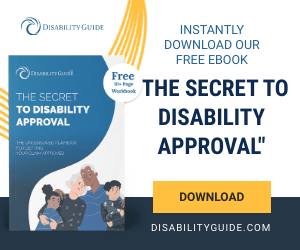Getting Approved
Avoid these mistakes if you’re filing a Social Security Disability claim
About 70 percent of all Social Security Disability Insurance claims are initially rejected for a variety of reasons. Some of the reasons for those rejections are minor and procedural—they can generally be corrected, giving you a much better chance of approval upon appeal. Other mistakes are more significant, and you can save time and frustration by either paying more attention to them up front, or by educating yourself as you go along.
The process is long enough and complicated enough when you do follow all the rules and guidelines, so the best advice is to not make gaining approval any harder than it already is.
To give you the best possible chance of approval, here are several mistakes you should avoid at various stages of the SSDI application process.
Contents
- 1 Before you file a claim
- 1.1 Don’t apply for the wrong program
- 1.2 Don’t enter into the SSDI claims process before you do your homework
- 1.3 Do not wait too long to file for SSD benefits
- 1.4 Do not file for benefits too early
- 1.5 Applying when your medical condition is not severe enough
- 1.6 Don’t stop going to the doctor
- 1.7 You have not followed your doctor’s prescribed treatment
- 1.8 You haven’t provided enough medical evidence to support your claim
- 1.9 You didn’t see a specialist to solidify your claim
- 1.10 You did not talk with your doctor before submitting a claim
- 1.11 You did not list all of your medical impairments
- 1.12 You don’t meet basic non-medical requirements
- 1.13 Your disability is primarily due to alcohol or drug use
- 1.14 Don’t automatically assume you will be granted benefits in a short time frame when you apply
- 1.15 Don’t file a claim while you are still working
- 1.16 Don’t underestimate or exaggerate the impact of your disability
- 2 During the claim process
- 2.1 Don’t apply for SSDI and Unemployment Benefits
- 2.2 You keep working until a decision is reached on your claim
- 2.3 You do not closely oversee the gathering and delivery of your medical documentation
- 2.4 Your medical records do not match your statements and testimony
- 2.5 You move slowly in responding to requests for additional medical records
- 2.6 You won’t cooperate with SSA
- 2.7 You didn’t complete all of the SSD claim forms
- 2.8 Don’t make it easy for SSA to get in contact with you
- 2.9 You expect to collect benefits if you’re currently incarcerated
- 2.10 Don’t commit fraud!
- 2.11 You didn’t get professional help
- 2.12 Don’t regularly check the status of your SSDI application
- 2.13 Don’t miss deadlines!
- 3 After you have filed an initial claim
- 4 For more information…
Before you file a claim
Don’t apply for the wrong program
Social Security operates Medicare, retirement, and two disability programs — SSDI and SSI. The disability programs provide payments to people who need financial help in conjunction with their physical and mental disabilities. People often times confuse the two, and it is your job to make sure you apply for the right one, based on which one you qualify for so that you do not waste time pursuing a benefit that you may not be qualified to receive.
Social Security Disability Insurance (SSDI) pays benefits for people who have worked and paid into Social Security through payroll deductions, and who have a disability that is expected to last at least one year or until they die.
Supplemental Security Income (SSI) helps people who are disabled but do not qualify for SSDI benefits, either because they have not worked for a long time or they are students who have not yet entered the workforce. It is based completely on need and is generally for people with very low incomes who are 65 or older.
Another major difference between the two programs has to do with waiting times before benefit payments can start. SSDI has a five-month waiting period from the time a person becomes disabled before they can start seeing payments. SSI has no waiting period and recipients can start receiving benefits the month they file their claim.
Health insurance is also an important difference as well. SSDI recipients must wait two years from the month they became eligible to get Medicare coverage, while SSI recipients can get Medicaid coverage as soon as they are approved for SSI benefits.
There are rare instances when a person may qualify for both SSDI and SSI benefits, mostly due to a change during income and assets while waiting for SSDI coverage. But most of the time, SSI benefits will terminate if a person starts receiving SSDI benefits because SSDI benefits are higher in a vast majority of cases.
Don’t enter into the SSDI claims process before you do your homework
Many people are a bit naïve when it comes to filing an SSDI application, believing it’s just a matter of filling out a few forms and waiting for a quick response. As a result, many people are also surprised as how complicated and thorough the process actually is.
Applicants should understand that SSA follows a five-step checklist to determine if a person qualifies for benefits:
- You must not be gainfully employed, meaning you can’t be earning more than $1,090 per month.
- Your condition is severe, meaning it interferes with basic activities of work you are qualified to do.
- Your condition is on the Social Security Administration’s list of disabling conditions, and you will be disabled for more than a year or your condition will result in your death.
- You are not able to do the work you had been doing before the impairment.
- You can’t perform any other type of work.
If you’re clueless about disability from the start, chances are you won’t get very far. Disability is a lengthy and complicated process, so do your due diligence by researching Social Security Disability. If you don’t understand the disability program you’re applying to, you’re probably wasting your time. Knowledge is power.
It can take over a year just to get a court date! Being prepared will be your biggest benefit. Make sure to have up-to-date medical records, your doctor’s supporting statements, and an disability lawyer by your side to give yourself the best chance possible.
Do not wait too long to file for SSD benefits
Many people have a hard time accepting help, especially from the government, so they exhaust their own resources before applying. What they may not realize is that even in a best-case scenario, it will take several months to get approval for SSDI benefits. And, with such a high initial rejection rate, it may take many months longer, sometimes as long as two to three years.
Your best bet is to start your application as soon as you think you qualify for benefits. If you get better, you can always withdraw your application. For SSDI benefits, you can only be paid up to one year before the date you initiate your application. Even if a judge were to find you became disabled 10 years ago, you can only get paid benefits for a maximum of one year before your protective filing date.
Do not file for benefits too early
Conversely, some people jump the gun and apply for benefits too early in anticipation that their disabling condition will last for 12 months or longer. If you apply for SSD benefits too soon, you could have a harder time proving that you are suffering from a long-term or permanent disability. In some cases, the claims rep or medical examiner may assume your condition will improve before you would qualify for the benefits you are applying for.
Because of this, you should only apply for benefits once it has been clearly established your disability will indeed last for one year or more.
Applying when your medical condition is not severe enough
Disability benefits are for people who will be out of work for one year or longer or that will result in death. Conditions that are only expected you keep you out of work for a few months, such as broken bones or pregnancy, do not qualify for SSDI.
You can be denied benefits even when SSA acknowledges your medical conditions, usually because your medical conditions don’t preclude all work activity – only some work activity. To qualify for SSDI benefits, you are required to be unable to perform any substantial and gainful work activity.
Don’t stop going to the doctor
Because so much of qualifying for SSDI benefits rests with getting an appropriate and recent diagnosis for your disability, it is critical that you keep getting medical care. Be sure to keep all of your appointments because the results of those appointments will help to detail your condition. If you don’t go to the doctor or provide enough information, SSA may decide your condition isn’t severe enough for benefits.
While SSA may send you to see one of their independent doctors for a “consultative examination,” generally the first two decisions on your claim are made entirely based on your medical records. You may eventually have to testify in front of a judge, and it is essential for the judge to have thorough and complete medical records to review before reaching a decision about your claim.
You have not followed your doctor’s prescribed treatment
The SSA sees your doctor’s medical treatment plan as “what you can do to help yourself”. If you aren’t following your doctor’s treatment plan or taking your prescribed medication, it appears to Social Security that you’re refusing medical treatment. If you have issues or don’t agree with your doctor, you are allowed to switch!
While there are exceptions to this rule, in most cases the SSA will see failure to follow treatment as being unwilling to help yourself and your condition, resulting in a denied SSDI claim. Not following treatment as prescribed is a red flag that someone may be acting fraudulently in the eyes of a claims rep or a judge. If the applicant is not trying to get better to regain entry into the workforce, whether or not they follow every piece of every doctor’s advice, it is sometimes difficult for an adjudicator to justify granting benefits.
You haven’t provided enough medical evidence to support your claim
Sometimes the SSA will deny disability benefits because there is not enough medical evidence to prove it will hinder your ability to work. If this is why your claim is denied, you should work closely with your doctor to document your limitations and appeal the decision.
Medical records are the most important part of your claim. The more that evidence can show a clear progression of an illness, or a clear start date of disability, the better. The more comprehensive the records, the better.
Gathering records can be very time consuming, but it is critical that you be as thorough and as complete as possible. Make sure that all the records have contact information in the event the examiner needs to get in touch with your medical professional. Also make sure they are current, no more than 6 months old, and that they are legible. If you can’t read them, then a rep or medical examiner won’t be able to read them either.
Because evidence statements from your physician carry the most weight, have your treating physician complete a Residual Functional Capacity Form to clearly and plainly document your current disabling condition. RFCs are not just for physical issues, if you are being treated for mental disorders, have your psychologist or psychiatrist complete an RFC on your behalf as well.
Without proper documentation, the SSA won’t be able to see how severe your condition is. Collecting medical evidence may be one of the most important jobs for a claimant so you’re able to prove that your disabilities prevent you from working.
Too much information is always better than not enough when it comes to medical documentation. If you are in doubt whether to include certain information or not, it’s always best to add it.
You didn’t see a specialist to solidify your claim
If you are concerned about rejection, before you file, see a specialist who treats your specific kind of disabling condition. Claims reps and medical examiners place the most weight on what medical professionals diagnose on your behalf, and a supporting diagnosis from a specialist will carry great weight in determining your eligibility.
You did not talk with your doctor before submitting a claim
There are times when your condition will make it obvious that you should be granted benefits. However, if there is any doubt, you might want to chat with your doctor beforehand to make sure they will support your upcoming claim. If your doctor is not sympathetic to your condition, it may work against you. If your doctor is not willing to support you, it might be best to look for one who will.
You did not list all of your medical impairments
Before you apply, it is not only important to gather information on the most disabling of your conditions, but to gather records and documentation on ALL of your disabling conditions. For example, if you have back pain, cancer or arthritis, you may also be suffering from depression, high blood pressure, or other secondary conditions as well. It is a requirement for Social Security to consider every one of your impairments singly and in combination with each other. Listing each condition will pay off, even if it does not seem as disabling as the others.
You don’t meet basic non-medical requirements
If you earn income of more than $1,090 per month or you don’t have sufficient work credits, you will receive a technical denial on your SSDI application. Under these conditions, SSA won’t even look at your supporting medical evidence.
Your disability is primarily due to alcohol or drug use
If you are suffering from alcohol or drug abuse, and it is the primary reason that prevents you from working, you will not be able to collect SSDI benefits. However, you can still receive benefits for conditions caused by alcohol or drugs, but it just can’t be the main contributing factor to your illness.
What this means is that if you have developed disabling conditions due to alcohol or drug abuse, such as cirrhosis or other related diseases, then your claim may be approved. However, if the reason you can’t work is because you are taking drugs or you are an alcoholic, meaning you can’t function properly in a work environment, and you are otherwise healthy, then your claim will be denied.
Don’t automatically assume you will be granted benefits in a short time frame when you apply
Many people underestimate the stringent requirements for getting a claim approved. As such they don’t plan financially for a long appeal process. This can put severe financial strain on a family. Because of the high initial rejection rate, you should actually plan for the opposite and assume it will take several months, if not a couple of years, for you to start seeing SSDI benefits, if at all.
Don’t file a claim while you are still working
There’s no hard and fast rule against filing a claim while you are still working, but since the whole idea is to financially assist you because you are too disabled to perform substantial gainful work, there’s a good chance your claim will not be approved if you do so. If you are working and you file an SSDI application, you are basically contradicting yourself and your claim that you are unable to work.
Don’t underestimate or exaggerate the impact of your disability
You will be telling your story to experienced claims reps and medical examiners. They have seen hundreds, if not thousands, of cases and will be able to spot it when a claim does not ring true. Do not overstate your case. You must be as honest as possible at all times and be prepared to tell the truth to SSA personnel, healthcare providers, attorneys, judges and others who may be involved in deciding your case.
Many people also underestimate the extent of their disabilities due to a number of factors, including that they have endured the condition so long they have learned to cope with it.
If you aren’t truthful about your disabilities, you could be penalized in a few different ways. Disability fraud is a serious offense. Downplaying and minimizing disabilities penalizes you directly and almost immediately. If you are truly disabled and fail to disclose some of those disabilities, you may not get the treatment you need. Rule of thumb: just be honest. Honesty is always the best policy. Overstating details and your abilities may have opposite effects than you intend. Be precise, but brief.
During the claim process
Don’t apply for SSDI and Unemployment Benefits
Unemployment Insurance is for people actively searching for jobs. Disability is for people who cannot work. The two programs contradict each other; they are not interchangeable. You’re either looking for work or you can’t work — apply for the program applicable to your situation.
One of the key requirements for collecting unemployment benefits is that you must be ready, willing, able and available to work. This requirement is consistent no matter what state you live in.
When applying for disability, you have to prove that the disability will last at least 12 months or result in death. The SSA says that collecting unemployment while applying for disability benefits won’t prevent someone from getting benefits, but it can very well be counted as a factor in decided whether you are disabled or not.
If a judge or an SSA analyst sees that the SSDI applicant is attempting to collect benefits from both programs, you will have some explaining to do, and chances are you will be unsuccessful at it, meaning you will be denied benefits from one program or the other.
You keep working until a decision is reached on your claim
This is only partially accurate. You may show some income, but SSA will not even evaluate your claim if you are working and earning income over a level that is considered “substantial gainful activity.” This amount is currently $1,090 per month before taxes. If you show income over this amount, you will be issued a technical denial and SSA will not even consider your medical evidence.
If you’re applying for SSI and still working, you’ll have to either work fewer hours, or quit your job to be sure you won’t exceed the income limit required for SSI. Furthermore, as part of the non-medical requirements for both SSI and SSDI, you cannot perform substantial gainful activity (SGA), and earning over a certain limit is considered to be SGA.
You do not closely oversee the gathering and delivery of your medical documentation
Disability Determination Services may send you to a consultative examiner to gather more information, but you shouldn’t rely on this doctor to provide a detailed analysis of your condition. Generally, they will only provide what the disability examiner requests.
Make sure Disability Determination Services has as much detailed information about your condition as possible by providing your own records. Take the time to gather everything that you can to support your claim. Chances are it will take a fair amount of time and effort, but if your goal is to collect SSDI benefits, you must be willing to take responsibility for your own situation and closely monitor your own claim to the best of your ability.
Your medical records do not match your statements and testimony
SSA puts a great deal of emphasis on medical records, and they will want to see consistency between what is in those records and what you verbally tell them about your condition. It will raise a big red flag if you do not convey the same information as your records indicate.
You move slowly in responding to requests for additional medical records
If you are initially rejected, chances are additional records will be required if you plan to file an appeal. It is critical to note that you only have 65 days to file an appeal. And an emergency on your part does not necessarily make for an emergency on the part of those who hold your medical records. It can sometimes take weeks to get important files from all of your medical providers. Act immediately and assume you’ll need a long lead time to get what you need.
You won’t cooperate with SSA
If you refuse to give the Social Security office permission to gather your medical files, or you don’t show up for your consultative exam, you will be denied for benefits. Do whatever is asked of you to give your disability case the best chance for approval.
Requests for more information are ordered because there is not enough medical evidence currently in hand to support your claim as it stands. The SSA can’t just accept your word on things. They require proof in the form of an evaluation from one or more doctors.
Cooperate fully or expect to be denied benefits.
You didn’t complete all of the SSD claim forms
Yes, the process is onerous and time consuming. And yes, there are a lot of forms to fill out. But you’re asking the government for money and it’s their job to make sure that the funds are going to someone who absolutely qualifies for benefits.
Don’t get discouraged. Take your time and fill out everything, even if it seems redundant. There’s always a reason for every form, even if it doesn’t make complete sense to you. Patience and paying attention to details in the beginning will hopefully pay dividends when it comes to deciding your case.
Don’t make it easy for SSA to get in contact with you
This one is pretty basic. If they can’t find you, they can’t follow up, whether it’s to ask questions, confirm benefits. or to discuss any aspect of your case. A claim denial is sure to follow.
Bottom line…if you move or change your phone number, update the SSA with your new information!
You expect to collect benefits if you’re currently incarcerated
You cannot earn disability benefits if you are currently in jail or prison. That’s not to say you can’t get approved and start earning them once you are released; you just can’t receive them while in behind bars.
Additionally, if your condition is the result of, or was made worse by committing a felony, you will not be eligible for benefits. For example, if you committed a robbery and were shot by the police as a result, causing you to become paralyzed, this would be considered a disqualifying event.
Also note that if you are on parole or probation, you are not entitled to benefits for any month you violate the terms of your release.
Don’t commit fraud!
If you are trying to collect SSDI benefits and you get caught trying to defraud the government, not only will you be denied benefits, you will also be prosecuted to the full extent of the law.
Be honest at all times when filling out forms, talking to claims reps, medical examiners, doctors, lawyers and judges. Sooner or later, if you lie, you will get caught. It’s not worth it to make a bad situation even worse by lying.
You didn’t get professional help
People with legal representation are much more likely to be approved for benefits than those without. Lawyers know exactly what the Social Security Administration is looking for, and they have a lot of experience going through the process.
However, not all attorneys are created equal. You should interview more than one Social Security Disability attorney before deciding which one you want to work with. If an lawyer or his or her staff cannot communicate with you effectively, the chances of that attorney being able to effectively represent you during your appeal are not going to be good either.
Look for a lawyer who has many years of experience and can point to cases that are very similar to your own. Also doublecheck to make sure they will take your case on a contingency basis, meaning they will only get paid if they help you win benefits.
The period leading up to the hearing as well as the actual hearing itself are generally when a lawyer is the most valuable for applicants. In addition to monitoring any communications from SSA, the attorney will review all the files that are currently part of your claim and update them so that you have the most current medical records to support your disability claim.
Although it is very much possible to win disability benefits by yourself, but understand it is not easy. Most people simply don’t have the knowledge to navigate their disability claim successfully. You can’t afford not to.
Don’t regularly check the status of your SSDI application
After you file your Social Security Disability application, it’s up to you to regularly check on the status of the application. How often you check may probably be determined by what stage of the process your claim is at, ie. initial application, reconsideration appeal, disability hearing, etc. How often you check will also depend on whether or not you have an attorney representing you, in which case it is their job to ride herd on your application. But this does not completely abdicate you of the responsibility.
There is no worse feeling than finding out your paperwork got lost, is incomplete or your case has been denied. The sooner you know these things, the sooner you can step in and correct any errors or deficiencies.
Don’t miss deadlines!
If you do at any point in the process, you will need to start your claim all over again. That alone should be enough motivation to avoid this costly mistake.
This point cannot be stressed enough. Do not waste your time by missing a deadline and having to start all over again. Appeal deadlines are 60 days from the date you receive the denial. The Social Security Administration assumes that most people will receive letters within five days of them sending it, unless you can prove you received it later. If you miss your deadline, you’ll have to start the entire process over.
After you have filed an initial claim
Don’t file a new SSD application after a denial
If you file a whole new SSD application, it will most likely be denied again. Your chances of approval significantly improve during the appeals process.
Many people think they can wipe the slate clean and fill out a new disability claim, and that it is a better route to go than appealing a currently denied claim. Unfortunately, this may raise a red flag for a claims rep who sees that you applied for SSDI and were denied benefits before.
Although an appeal may seem onerous, it is generally better to go through the appeals process rather than filing a new claim if you have been previously denied.
Filing a reconsideration is the only way to move your claim through the appeals process. Statistically, claimants have a better chance once they are able to explain their medical conditions to a judge, face-to-face.
Reconsideration appeals are generally decided more quickly that initial claims because most of the time, all the pertinent records have already been gathered. However, to improve the chances for approval, an applicant should also make every effort to try and correct the error that produced the initial rejection, most times by submitting new medical evidence or other similar documentation.
Ignore the possibility of seeking a Compassionate Allowance to get benefits quickly
It can take several months to be approved for SSDI benefits. But SSA has an obligation to provide benefits as quickly as possible if you have an extremely serious medical condition.
These serious conditions include things such as some types of cancers, rare and terminal disorders, dementia and Alzheimer’s disorders, among others. Collectively, they are known as Compassionate Allowances (CAL) and are a subset of the Listing of Impairments that Social Security uses to define what conditions qualify for SSDI benefits. Persons with conditions listed as Compassionate Allowances generally have to provide much less medical information that can be obtained quickly, and can get approved in a matter of weeks.
There are about 220 qualifying conditions and the current list of those Compassionate Allowances can be found on SSA’s website.
Applicants should go through normal submission procedures and SSA will identify and expedite applications with a CAL condition. How long approval takes depends on how quickly medical records can be obtained from an applicant’s doctors. You can also hire an attorney to oversee your application process and ensure it is dealt with in a timely manner.
Don’t give up!
Last, but not least, as you go through the entire application process, DO NOT GIVE UP. Getting benefits can be a long and arduous process.
Don’t give up if you receive a denial. Notify the Social Security Administration that you’d like to appeal. Remember that nearly 70 percent of initial claims are denied, but the majority of people get approved in one of the appeals stages.
For more information…
A good place to start with general questions regarding Social Security Disability Insurance is by calling the Social Security Administration at (800) 772-1213. They will be able to answer basic questions and direct you to more targeted resources depending on your needs. If you prefer, you can also visit the SSA website at www.ssa.gov.
If you’re deaf or hard of hearing, you can call the SSA toll- free TTY number at 1-800-325-0778, between 7 a.m. and 7 p.m. on business days
To get a Disability Starter Kit, you can go online here and download a copy that will help you start your claim process.
Social Security offers a series of YouTube videos that will walk applicants through disability claims, including an introduction to the process, filing a disability claim, medical evidence, quality review, appeals, the Appeals Council and the end of a claim.
SSA also has a Disability Planner that can assist and instruct you on how to qualify for benefits, give you tips on getting approved, and more.
You can view additional information on disability evaluation and a full listing of impairments that are considered severe enough to prevent an individual from doing any gainful activity. Part A of the list covers the evaluation of impairments for adults 18 and over. Part B applies only to children under 18.
Was your disability claim denied? Click to see if you qualify for professional help.
Getting Approved
10 Ways to Keep Your Mind Sharp

It’s back-to-school season again. And even if you’re not heading to classes this fall, there are still lots of ways you can develop healthy habits that improve your thinking skills.
By finding simple brain training exercises to keep your mind sharp over the years, you’ll not only improve overall brain health, but also prevent cognitive impairment over time. To give you some ideas, here are 10 things that have been proven to improve brain function and cognitive skills.
1. Get plenty of sleep—Perhaps not the first tip you were expecting, but getting enough rest does an awful lot to keep your mind fresh and invigorated. Plus getting seven to nine hours of sleep consistency has been linked to improved brain function and a significant increase of memory functions. On the flipside, frequent sleep deprivation is also linked to cognitive decline in old age. The relationship may not be causal, but it’s definitely something to think about.
2. Journal by hand—Here’s an interesting fact: did you know that handwriting, the kind that involves a pen and paper and no technology whatsoever, has actually been shown to sharpen your mind? Studies have also found that when you take notes by hand, you are exponentially more likely to remember them afterwards. So if you want to give your mind a workout and remember something, write it down the traditional way.
3. Drink lots of water—Yes, yes, I know how tired you are of hearing this one, but staying hydrated really does improve every aspect of your health, including your long-term mental health. Water cleanses your body and your brain tissues, and it also helps boost your energy, increase alertness, and curb hunger too. A study published in 2006 actually discovered that people who stayed well hydrated and also consumed a healthy diet of fruit and vegetable juices had a decreased risk of developing Alzheimer’s disease.
4. Always continue learning—It stands to reason that the best way to keep your brain in tip top shape is to use it, especially for older adults. You don’t have to be in school to keep learning, so look around for opportunities to try new things. Attend a local seminar. Learn some new software at your local library. Take a meditation class at a community college. Reading new books and interesting articles online is my personal favorite way to keep learning, so do whatever you find most interesting.
5. Break your routine—This might be a hard one if you’re a just-so creature of habit like me. But learning a new skill or just altering your day-to-day routine is actually a great way to stimulate different parts of your brain and prevent both your life and your internal chemistry from going stagnant. I fully give you permission to break out of your shell and do something a little crazy that maybe you’ve never tried before.
6. Use all your senses—All five of your senses are linked to separate parts of your brain, so using all of them regularly is a great way to both stimulate your cognitive abilities and invigorate yourself. Looking at beautiful art, browsing a fancy candle store, trying exotic new foods, and attending a live concert are all great options. Plus unique sensory experiences also boost your memory. Did you know you’re much more likely to remember pictures and experiences when they’re paired with specific scents? Food for thought . . . or your nose I guess?
7. Get some regular exercise—Physical exercise is another great refresher for the brain and has actually been proven to reduce the risk of dementia. So get moving. Living a generally active lifestyle and getting at least 30 minutes of exercise every other day will do wonders for both your physical health and your mental health. Aerobic exercise is also a great break from technology and a good old-fashioned way of increasing blood flow and lowering your stress levels naturally.
8. Stimulate your brain—If you’ve heard any advice about keeping your mind sharp, it’s probably this one. A brain game is a fantastic way to challenge your brain cells and reduce your risk of age-related memory loss. So give some a try. Sudoku is my personal favorite, but crossword puzzles, Mah Jongg, and brainer teasers like these are great too. Remember the key is to introduce novelty to your brain, plus the feeling of accomplishment when you defeat a particularly tricky puzzle is well worth the effort all on its own.
9. Believe in your healthy brain—There are a lot of myths about memory loss wandering around out there, and it’s actually in your best interest not to believe what you hear. Studies have actually shown that people who feel stress about losing their memory or put too much stock into mental decline stereotypes are much more likely to experience mental decline and memory-loss difficulties. So give your brain power the benefit of the doubt.
10. Don’t be too hard on yourself—Along with believing in your brain, be kind to yourself and take it easy on your memory skills. Everyone has little slip ups and moments of forgetfulness, so don’t beat yourself up for being human. Feel free to invest in a good planner to help you remember things, and keep in mind that forgetfulness is sometimes a sign that you’re packing too much into your brain. So give yourself the freedom to forget the little things that really don’t matter all that much in the long run.
Want to read more healthy living tips? Try this one on seven ways to beat your stress or this one about all the virtues of drinking more water. Some of them might surprise you.
Getting Approved
Quick Tip: List Your Attorney as a Contact for the SSA

As you’re preparing your application for Social Security Disability, one of the best things you can do to help your case is to list your disability attorney. Every application has a section for relevant contacts that the SSA can ask about your case, and who better to have them call than the person who knows the most about getting you approved?
Keeping an open line of communication between the SSA and your disability attorney is arguably the number one thing that will get your application through on the very first try for all kinds of reasons:
1. Your disability attorney is intimately acquainted with your case. Because of this he or she will be able to answer the SSA’s questions in a way that will accurately and effectively represent you.
2. Your attorney knows the SSA lingo. While your close friends or your family doctor might know an awful lot about your condition, your attorney is the one who will know how to translate your case into terms that will make sense to the SSA—and increase your chances of approval.
3. They’ll know how to handle any obstacles that arise. If your attorney is in regular contact with the SSA, he or she will be right there to resolve objections and stop approval-killing obstacles before they become a reason for your application to be denied.
4. Your attorney knows what NOT to say. There are things that will improve your case and also things that will not improve your case. Since your disability attorney is familiar with the ins and outs of approval, they need to be right on the front lines to help you steer your application to success. Why else would you have hired them?
For even more fantastic benefits of working with a disability lawyer, check out this great blog post.
Getting Approved
Can Social Media Activity Affect My Disability Case?

In the age of social media, nothing is private anymore. Every day, millions of people from older adults to adolescents upload personal information about themselves and their social relationships. Most of the time, we do it without thinking about how their social media posts could be used by others.
If you are filing for Social Security Disability benefits, you should be highly aware of what you are posting on social media sites. Even things that may seem innocuous have the ability to affect a disability examiner or administrative law judge’s opinion about your disability claim and your status as a disabled person.
While the Social Security Administration has official rules prohibiting examiners and judges from searching the Internet for information about disability applicants, that doesn’t mean it never happens. It just means that social media activity cannot be cited as a primary reason for denial in a disability decision. Public information about you could still be found, and could color a case evaluator’s perception of your claim.
We’re not trying to scare you off Facebook and Twitter forever. Social networking and following the right influencers can be a beneficial source of social support within the disability community. We just want to you to be aware of what information is publicly visible on your social media accounts. As long as you’re being honest about your disability issues, mental health, physical activity, and functional limitation on your Social Security Disability application, you shouldn’t have any problems. But just in case, you may want to do an audit of your social disabled community to see what information about you is publicly available.
Delete anything you feel could affect your case for benefits. Even an innocent status update posted in jest such as “love all this free time I have waiting for disability benefits,” could raise some eyebrows by the Social Security employees evaluating your claim.
Once you’ve cleaned up your social media sites, consider making them private if you haven’t done so already. Not just because you are applying for disability benefits, but because it’s simply a good idea for your protection. You never know how people will use your information, and the last thing you want is for it to fall into nefarious hands.
Finally, as you move through the disability process, be mindful of what you are sharing and how a disability examiner or administrative law judge could react to it. While your profile may be set to private, there are other ways it could end up in front of public eyes.
In the end, your social media accounts probably won’t have much of an impact on your Social Security Disability case, but it’s better to be safe than sorry. If you have any concerns about your claim for disability benefits, including whether your social media activity could be hurting your case, you should consult with an experienced Social Security disability attorney.
Curious on what other behaviors might have a negative impact on your Social Security Disability claim? You’ll definitely want to read our article with “10 Things You Shouldn’t Do When Filing for Social Security Disability.”
-

 About SSI & SSDI9 years ago
About SSI & SSDI9 years ago6 Different Types of Service Animals
-

 Getting Approved10 years ago
Getting Approved10 years agoWill Medical Marijuana Affect My Social Security Disability Case?
-

 About SSI & SSDI10 years ago
About SSI & SSDI10 years agoHow the Social Security Blue Book of Impairments Can Affect Your Disability Claim
-

 About SSI & SSDI9 years ago
About SSI & SSDI9 years agoSSDI or SSI: What Makes These Programs Different?
-

 Getting Approved10 years ago
Getting Approved10 years ago9 Useful Secrets For Filling Out The Social Security Disability Application
-

 Getting Approved10 years ago
Getting Approved10 years agoQuick Tip: List Your Attorney as a Contact for the SSA
-

 About SSI & SSDI10 years ago
About SSI & SSDI10 years ago9 Common Reasons Social Security Disability Claims Are Denied
-

 Getting Approved10 years ago
Getting Approved10 years agoCan Social Media Activity Affect My Disability Case?


